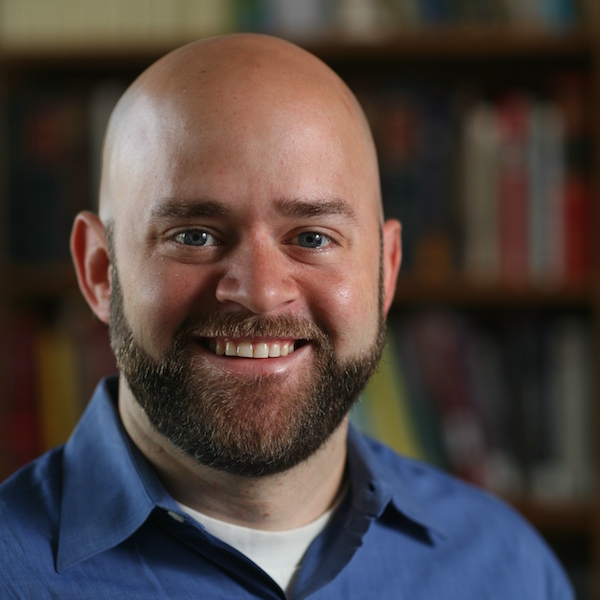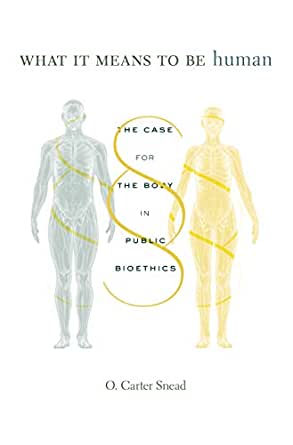“The purpose of law is to protect and promote the flourishing of persons. Accordingly, the richest understanding of the law is an anthropological one, obtained by inquiry into its underwriting premises about human identity and thriving. In order to be fully wise, just, and humane, the means and ends of the law must correspond to the reality of human life, humanly lived.”
This is how O. Carter Snead states the basic premise of his recent book, What It Means to Be Human. He thus recasts attractively what can appear to be a frumpy traditional view, that “the goal of the lawgiver is the virtue of his citizens” (Aristotle), while putting a classical spin on Jefferson’s notion of the “pursuit of happiness.”
Snead cannot discuss all of law, of course, so he restricts himself to “bioethics”– abortion, artificially assisted reproduction, and assisted suicide. Certainly, “anthropological assumptions” are easier to notice in such matters. But he does not deal with marriage – a serious omission for his project, as I’ll explain later.
Snead finds that the law in “bioethical” matters, mainly Supreme Court decisions but also some state laws, springs from and promotes “expressive individualism.” This is the view that we are in essence unencumbered minds and wills, whose purpose is to express ourselves and create a narrative of a life.
Our bodies are incidental to this task. We have no obligations besides those we have freely accepted. Our relationships with others are purely “instrumental and transactional.” Importantly, “natural givens offer no guidance for understanding or negotiating the world.”
In sum, it’s a view of oneself likely to appeal to professors, the symbol-using class, people at high levels of business, and especially lawyers.
But “expressive individualism” is false, and laws that promote a corresponding vision of human flourishing will not be wise, just, or humane. What in contrast is the proper anthropological vision? Snead’s one-word description is human life as “embodiment”: as embodied beings, we are vulnerable, dependent, and subject to natural limits. As such “we need robust and expansive networks of uncalculated giving and graceful receiving, populated by people who make the good of others their own good.”
At key points in his argument, Snead gives a litany of genuine human realities that never seem to find their way into Supreme Court jurisprudence, to our increasing impoverishment: “generosity, hospitality, and accompaniment in suffering (misericordia), as well as gratitude, humility, openness to the unbidden, tolerance of imperfection, solidarity, respect for intrinsic equal dignity, honesty, and cultivation of moral imagination.”
We all want a society suffused with these goods. Thus Snead, with his wonderful premise about the purpose of law, gives us a way to sidestep a logjam in Supreme Court jurisprudence. Is the meaning of the Constitution given by original intent, or original public meaning, or is the Constitution a “living document” that should be adapted to the time?
On any view, the purpose of law is to protect and promote the flourishing of persons, and therefore we should take care that law is based on a truthful anthropology. The holding of Roe v. Wade, then, should be put aside simply for the disastrously wrong view of ourselves that it presupposes, and continues to foster.
But the main upshot of Snead’s book, I think, is to demolish a false dichotomy, which makes “expressive individualism” seem the only alternative to what used to be called “the subjection of women.”

If you want to see the dichotomy in all its misguided starkness, look no further than the thought of Justice Ginsberg in her dissent to Gonzales v. Carhart (2007). Abortion is necessary, she says there, for a woman to have complete control over her reproductive life, which is necessary if she is to have “autonomy to determine her life’s course,” which is necessary for her to “enjoy equal citizenship stature.”
The only alternative, she thinks, is to return to the view that women are “the center of home and family life, with attendant special responsibilities that preclude. . .full and independent legal status under the Constitution.” She quotes an 1873 Supreme Court decision that “Man is, or should be, woman’s protector and defender. The natural and proper timidity and delicacy which belongs to the female sex evidently unfits it for many of the occupations of civil life. . . .The paramount destiny and mission of woman are to fulfill the noble and benign offices of wife and mother.”
Go back to Gonzales and re-read the eyewitness testimony of a nurse attending a partial-birth abortion, which Justice Kennedy included at the beginning of his opinion. I will omit it here. It’s too gruesome even for a Halloween-week slasher flick. But consider that RBG and those like her are so much in the grip of their false alternative, that they would accept partial-birth abortion rather than return, as they think, to women disbarred from civic life.
To this unfortunate paralysis of will and good sense, Snead provides a way out. Let’s think about the kind of society, in general, we want to foster, he says. Surely we can make room for everyone’s full participation in the life of a citizen, while at the same time not implicitly attacking generosity, hospitality, openness to the unbidden – “uncalculated giving and graceful receiving.” “Expressive individualism” will ultimately destroy us.
The one lacuna of the book is its failure even to mention male-female complementarity in connection with “embodiment.” Yet the “nuptial meaning of the body” seems foundational for the anthropology that Snead recommends. Thus, for example, when insisting that the good of the child should be the governing ideal of assisted reproduction, he speaks of “parents, regardless of type,” and refrains from saying that children are best raised by a mother and a father. Neither does he offer a critique of surrogacy.
The whole truth was omitted, one suspects, in the interests of persuasion, but will anything short of the whole truth help us in the end?
















